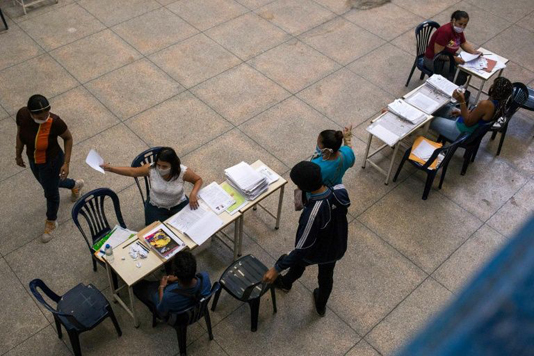CARACAS, Oct 17, 2020 (BSS/AFP) – Thumbing his mobile phone, Jonathan
Figueroa sits on his doorstep in a desperate daily quest for a Wifi signal to
download his homework.
Battered by the pandemic and economic collapse, Venezuela’s lost
generation of schoolchildren have little chance of linking up regularly with
online classes given the country’s fickle internet coverage.
The 14-year-old doesn’t even have the luxury of virtual classes at his
school in a poor district of Caracas, where the cost of computers is out of
reach for most families.
Instead, what little interaction he has with teachers is limited to voice
messages and assignments delivered on WhatsApp.
“It’s complicated. Sometimes I don’t understand anything at all,” said
Jonathan.
In some ways, he is one of the lucky ones, because his mother’s employer
gave him a used tablet.
– ‘Wasting time’ –
But amid routine power blackouts and random internet availability,
Jonathan feels overwhelmed and increasingly estranged from his school
environment.
“Not only am I doing my homework badly, but I’m wasting time,” he said.
To make matters worse, Jonathan and his mother Viviana — who share a
pokey rented room in a poor district — contracted the coronavirus in July.
Officially, some 85,000 cases of Covid-19 have been detected in Venezuela
— a country of 30 million — with just over 700 deaths linked to the
disease. Those figures are challenged by the opposition and some NGOs, who
claim the real figure is much higher.
“We had Covid-19, and then God wanted us to get to know some people,” said
Viviana, recalling the solidarity of neighbors who brought them food and
water as they recovered their strength.
The cost of a smartphone or tablet represents years of savings for
families in a country where, according to a survey by leading universities,
eight out of 10 people live in extreme poverty.
– Slow connections –
Venezuela’s desperate economic crisis means that when the internet is
working, the connection is among the world’s slowest.
A survey by the Speedtest site in August ranked the South American country
169 out of 174 countries in broadband speed.
Paediatricians Luzmar and Francisco Rodriguez know all about weak
broadband signals. Their connection in the middle-class area of Caracas where
they live should be enough to enable their children to take their private
school’s online classes.
But instead the parents often have to drive around Caracas in search of an
elusive wifi signal.
“You buy them a computer, a printer, the internet, a laptop… and then
because of something as insignificant as rain, nothing works any more,” said
Luzmar.
Their eldest son Francisco connected to his school recently from a car
park outside a pharmacy, where the family managed to locate a signal.
When he has to take exams, Luzmar says she doesn’t go to work in case she
has to drive him around Caracas trawling for a connection.
At the other end of the link, teachers are frustrated, too. In September,
as the school year started, some took to the streets and went on strike over
a demand for decent wages.
Morelis Carruido, who teaches history and geography at a Caracas public
school, says staggering hyperinflation means her salary is “equivalent to
$2.50 a month.”
“I have to sew, knit, prepare cakes, cook… in short, anything that keeps
me going” to make ends meet, Carruido told AFP.
According to Jose Gregorio Castro, headmaster of the high school where
Carruido teaches, “more than 70 percent of the students do not have
internet.”
“Some don’t even have gas. They cook on wood fires,” added Carruido.
“How can they progress through online education if they don’t have enough
money to meet their most basic needs?”



